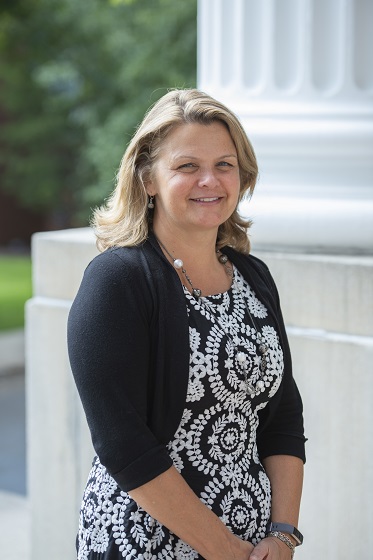Spotlight on President Chapdelaine Classroom Engagement

Hood College President, Andrea Chapdelaine, Ph.D., is a tenured faculty member in the psychology department, teaching social psychology at the graduate level.
President Andrea Chapdelaine
Program
- 4PLUS Psychology (B.A.)/Counseling (M.S.) Program
Department
- Psychology & Counseling
"I love teaching! And although this was probably the semester I least had time for it, as I was trying to lead Hood College through the pandemic, I also felt it would be really good for my wellbeing to do something that was not about the pandemic and that I derive such joy from."
Please provide a brief bio including your educational and career background
In addition to my presidency, I am also a tenured faculty member in the psychology department, teaching social psychology at the graduate level.
I began my teaching career at Wabash College in Crawfordsville, Indiana, from 1993 to 1995 as a visiting assistant professor. I also taught at Trinity College in Hartford, Conn., from 1995 to 1998 as a visiting assistant professor. I joined Albright College in 1998, where I was a psychology faculty member and also served as dean of undergraduate studies, before becoming provost.
During my career, I have taught introductory psychology, statistics, research methods, program evaluation, social psychology, psychology and the law, close relationships and community-based research. My most recent scholarly work has focused on supporting faculty through policies designed to promote flexibility and work-life balance, the value of undergraduate research to student learning and ethical issues in service learning.
Not a lot of college presidents make time to engage in teaching—why do you choose to do so?
The Hood College Department of Psychology & Counseling needed someone to teach a course, which is my disciplinary area, so I wanted to help. Also, I had heard about the challenges and hard work the faculty were undertaking to teach in a remote learning environment due to the pandemic, and I felt it would be helpful for me to better understand those challenges firsthand.
Finally, and most importantly, I love teaching! And although this was probably the semester I least had time for it, as I was trying to lead Hood College through the pandemic, I also felt it would be really good for my wellbeing to do something that was not about the pandemic and that I derive such joy from.
As Hood president and a faculty member teaching in the graduate program, do you have a certain mindset, theory, or teaching style you employ?
When teaching graduate students, I always assume they come to class well prepared, and that was certainly the case. That enables me to focus my comments on those areas I feel are most important and may require a bit more explanation. I try instead to facilitate as much discussion, peer learning and shared ownership of the class as possible.
What would you like your students to take away from your classes?
As a social scientist, one of the key messages I try to instill is for students to use their critical thinking and analytical skills they learn in psychology courses when evaluating any information based on research and statistics. As information consumers, we should always assess the quality of the research and the extent to which it is applicable for a given population before assuming its veracity or altering our beliefs or behaviors based on that information.
For example, if one hears on the news that 90% of those surveyed prefer cats as pets to dogs, we should immediately generate a series of questions regarding how that result was derived before accepting that as truth. Second, when teaching my discipline, social psychology, there are some fundamental tenets of human behavior I want them to always remember.
You really need the course to fully understand all of them, but an example would be that, first and foremost, we are social creatures – we need others to survive and thrive – and much of our actions can be understood as being driven by that most fundamental human need.
What unique traits and strengths among our graduate students do you notice or enjoy?
I enjoy the diversity of life experiences they bring to the course that enriches and deepens all of our understanding and learning. I often feel I learn as much from them as they are learning from me.
I also find their commitment to an education, usually on top of a demanding job and family obligations, both worthy of my admiration and inspiring.
Any other relevant or interesting information that you would like to share about your teaching experiences here at Hood College?
As I expected, learning to teach remotely was hard. I am so appreciative of my students’ patience and assistance with technology and providing feedback on how I could enhance their learning experience. We enjoyed a lot of laughs together, just the right anecdote to a very challenging semester!
Inspired to #GOFURTHER in your education and career path, click here to learn more about our graduate programs including the Counseling and Interdisciplinary Studies in Human Behavior master's programs.
Are you ready to say Hello?
Choose a Pathway
Information will vary based on program level. Select a path to find the information you're looking for!
